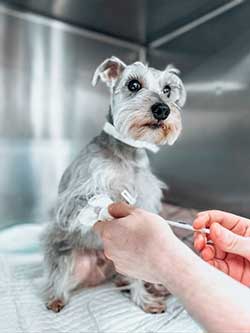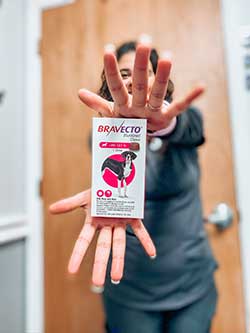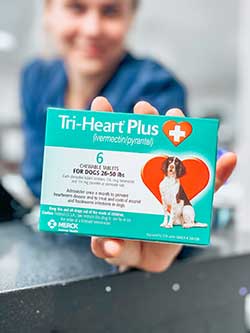Routine wellness exams are an essential component of your pet’s best and longest life. They allow our veterinarians to spot conditions early, before they can impact the health and happiness of your pet long term, and when they are at their most treatable stages.
Healthy animals should have annual wellness exams. Adolescent and senior pets, or pets with a health condition, may need more frequent check-ups due to their unique needs.
During the wellness exam, you can expect us to perform the following procedures:
In addition to a physical examination, we also recommend a yearly fecal test to check for internal parasites and healthy digestion.
 If you notice a change in your pet’s typical demeanor, sleeping patterns, eating habits, or any indication they are in pain, we encourage you to schedule a sick visit with us as soon as possible. Often, because animals cannot tell us what is wrong, there is a certain amount of intuition involved for pet owners to suspect their pet may be sick. We believe that it is better safe than sorry!
If you notice a change in your pet’s typical demeanor, sleeping patterns, eating habits, or any indication they are in pain, we encourage you to schedule a sick visit with us as soon as possible. Often, because animals cannot tell us what is wrong, there is a certain amount of intuition involved for pet owners to suspect their pet may be sick. We believe that it is better safe than sorry!
Sick visits will typically begin with a physical examination. We will also listen closely to your concerns and observations about their potential ailment. Often, further diagnostic testing, such as blood work or a fecal exam, may be necessary to pinpoint the issue for certain.
A quick shot now can prevent your pet from contracting a myriad of serious, and potentially fatal, diseases later. Vaccinations work by exposing your pet’s immune system to a small and therefore harmless amount of the potentially dangerous disease. This gives the immune system a chance to "practice" fighting the disease, by creating special antibodies. If the pet ever encounters the disease again in the environment, their immune system will be prepared.
Our veterinary team will assist you in choosing the appropriate vaccinations for your pet based on their lifestyle and risk of exposure. For example, if you travel often and board your dog in a kennel when you are gone, a vaccination against kennel cough may be more relevant for you than to other clients, or if you are taking a pet abroad, certain vaccinations may be necessary depending on your destination.
Here are some core vaccinations we recommend for all dogs:
Here is a list of vaccines that may benefit your dog depending on their unique lifestyle, which your vet may or may not recommend:
Here are some core vaccinations we recommend for all cats:
Depending on your cat's unique lifestyle, your vet may or may not recommend the Feline Leukemia vaccine.
We know that some owners may be concerned about over-vaccinating their pets. On the other hand, we all want your beloved pets to be protected from diseases. We encourage you to please voice your concerns to our veterinary team, and we will give you our best advice, based on years of experience, to help you make the best decision for your best furry friend.
A parasite is an organism which steals the resources of another animal to live. For example, fleas live on the skin and coat of furry animals and subsist off of their blood. Intestinal worms live inside the digestive systems of mammals and steal their food and nutrients. Parasites will make their hosts weak and unhealthy, and this will escalate as they multiply.
Keeping your pet parasite-free with preventative medicine and annual testing is crucial to their health and wellbeing - and the health of wellbeing you and your family as well. This is because some parasites are "zoonotic," which means that they can also infect humans.
Thankfully, there is a variety of preventative treatments for parasites, from topical applications to tasty chews. Our veterinary team will help you select the most useful preventatives for your pet’s lifestyle and risk of exposure.
Here is some information about a few species of unwanted critters:


Does your pet have an ID tag? Of course they probably do! You know that if they ever become separated from you, they should have your contact information on them so they can get home. But, do you ever remove their collar to bathe or brush them? Have you ever taken it off of them, or watched them pull it off? If they were stolen, could the person responsible not remove their collar and proceed without a repercussion? Although some of these questions seem far-fetched, most veterinary clinics and animal shelters can attest that they happen far too often.
Don’t be caught off guard if your pet is separated from you. Have him or her microchipped.
Microchips are so small, they can be inserted into the skin painlessly during a routine office visit. They are typically embedded between the shoulder blades, because this is a secure and relatively hardy area on your pet’s body. After the insertion, pets will have this form of identification with them for the rest of their lives.
Once they have the microchip implanted, you can send your pet’s information to a database. If another veterinary clinic or an animal shelter comes across your pet, they will scan the chip and contact you so you and your pet can hopefully have a sweet reunion in no time!
Remember to update your contact information if it ever changes, for example, during a move. And even if your pet does have a microchip, they should also have tags to keep them doubly protected in case of an emergency.
Nutrition is the source of your pet’s life energy. When they have proper nutrition and exercise, they can grow strong, stay healthy, and feel great. Pets with conditions such as diabetes, thyroid disorders, cancer, and more can benefit by eating a specially formulated diet. Our veterinarians can help you choose a pet food that is just right for your best buddy, whether or not they have an outstanding condition. For example, adolescent and senior animals have separate nutritional needs compared to middle-aged pets.
In addition to general nutrition, weight management is an important concern for responsible pet owners. Approximately 35% of dogs and cats are overweight or obese. Pets who are overweight have diminished life expectancies, and also experience a lesser quality of life. It is harder for them to play and engage in fun activities than their healthy-weight counterparts.
At Parker Animal Care, we will offer practical advice for managing your pet’s weight during their annual wellness exams. Here are some examples of habits to implement if you are concerned about your pet’s weight:
Located in the South Lamar neighborhood in South Austin. Directly off of US-290 between Bluebonnet and Oltorf.
Phone: 512-448-2676